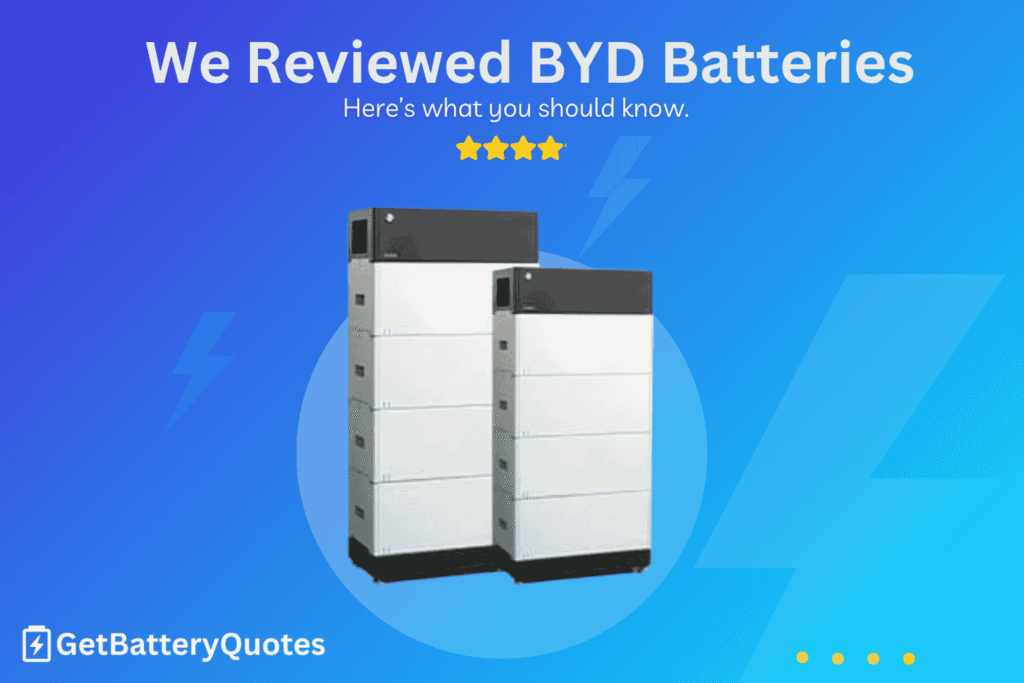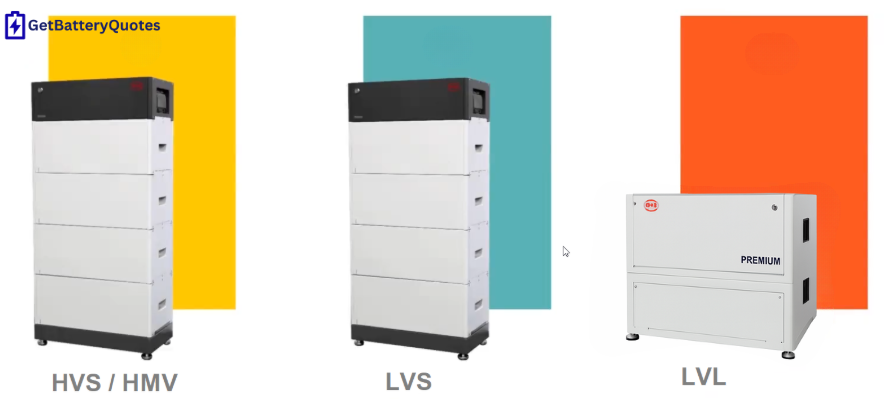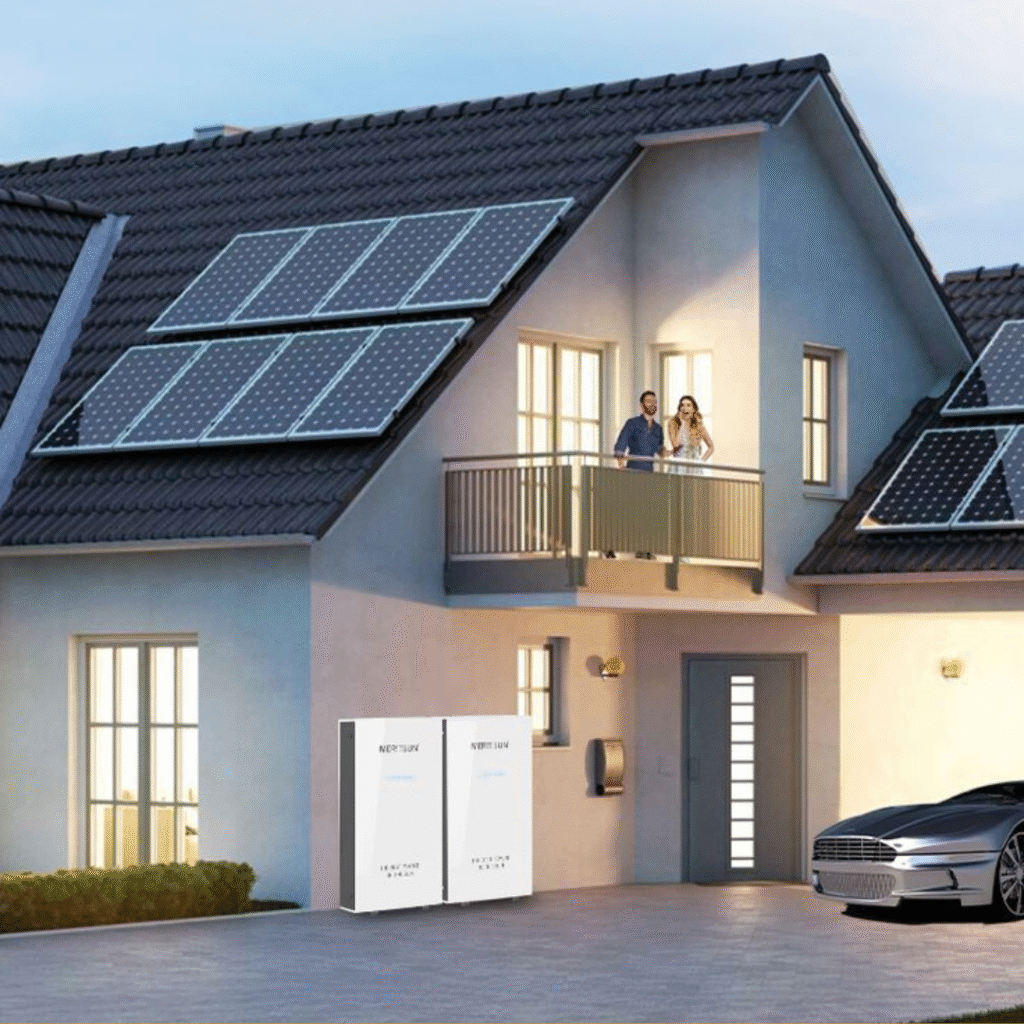Table of Contents
- 1. Safe. Scalable. Trusted. Here's what Aussie homeowners need to know.
- 2. Quick Pros & Cons
- 3. BYD Battery Evaluation: Performance, Experience & Support At A Glance
- 4. Is the BYD Battery Right for You?
- 6. About BYD: Company Background & Presence in Australia
- 7. BYD Battery Model Range
- 8. Key Specs – BYD Battery Comparison Table (Australia)
- 9. BYD Battery Pros & Cons (Expanded)
- 10. Support & Warranty in Australia
- 11. Ask Us Anything
- 12. Downloadable Resources
- 13. Final Verdict: Should You Buy a BYD Battery in 2025?
- 14. Is This Battery the Right Fit for You?
Safe. Scalable. Trusted. Here's what Aussie homeowners need to know.

Quick Pros & Cons
Pros
- BYD is a global battery leader with strong Australian presence
- Eligible for federal and state rebates (including WA, NT, and national $372/kWh)
- Safe, cobalt-free LFP chemistry with long cycle life
- Modular design lets you expand your system over time
- Excellent compatibility with leading inverter brands
- High round-trip efficiency (95–96%)
- Good VPP support in most states
- 10-year warranty with Australian support via Alps Power
Cons
- No built-in inverter . You’ll need a compatible hybrid model
- Not as sleek-looking as all-in-one alternatives
- Some models (like LVL15.4) are indoor-only
- Installation/configuration can be complex without the right installer
BYD Battery Evaluation: Performance, Experience & Support At A Glance
Technical Performance
Why it scores well:
- BYD batteries offer high round-trip efficiency (95–96%)
- Full modularity across LVS, HVS, HVM, and LVL models
- Suitable for on-grid, backup and off-grid use
- Compatible with major inverter brands like Fronius, SMA, and electronic
User Experience
Why it scores well:
- System is installer-friendly with plug-in modular design (especially LVS and HVM)
- No BYD mobile app. Relies on inverter brand’s monitoring (e.g. Fronius Solar.web)
- BYD reviews in Australia are generally positive, with long-term reliability noted
Trust & Support
Why it scores well:
- Eligible for all major battery rebates in Australia (Federal, WA, NT)
- 10-year warranty across the range, with Alps Power as local support partner
- BYD is a globally recognized battery brand, but not consumer-facing in AU. Relies on installer networks
Overall Score
80%
The BYD Battery Box range is a safe, scalable and proven choice for Australian homes. Its modular flexibility and rebate eligibility make it one of the most versatile battery systems on the market especially when paired with a quality inverter.
Get Upto 3 Quotes
Compare Battery prices from trusted installers and save thousands on your energy storage system
Is the BYD Battery Right for You?
You want a battery that can grow with your needs
You already have a hybrid inverter
Ideal for retrofit solar battery installations in Australia.
You want to claim battery rebates
A great choice if you’re trying to maximise rebate value.
You care more about performance than bells and whistles
Suits homeowners who value technical quality over visual polish.
It may not be for you if:
- You want a fully integrated battery + inverter in one unit (e.g. Tesla Powerwall-style setup)
- You’re looking for app-driven smart features out of the box
- You don’t have an installer familiar with BYD system configuration
Final Word:
If you want safe chemistry, modular flexibility, and long-term value and you’re working with a good installer a BYD Battery is one of the best choices available in Australia right now.
About BYD: Company Background & Presence in Australia
A global leader in battery innovation
BYD Battery in Australia
BYD batteries are widely installed in Australia, with all current Battery Box Premium models listed by the Clean Energy Council (CEC). This means they qualify for the federal battery rebate and are eligible for participation in virtual power plants (VPPs) where supported.
Service and support in Australia is handled by Alps Power Pty Ltd, BYD’s authorised partner. While BYD does not have a direct consumer-facing office, it works with a network of local distributors and accredited installers who carry out system design, installation, and warranty support.

BYD Battery Model Range
Battery-Box Premium LVS (Low Voltage – 48V DC)
- Battery capacity: 4.0 to 24.0 kWh per tower
- Expandable: Up to 256 kWh (multi-tower systems)
- Outdoor rated: ✅ Yes (IP55)
- Coupling type: DC-coupled
- CEC approved: ✅ Yes
- Popular sizes: LVS 8.0, LVS 16.0, LVS 24.0
Battery-Box Premium HVS (High Voltage – 102.4V per module)
- Battery capacity: 5.1 to 12.8 kWh per stack
- Expandable: Up to 38.4 kWh (3 systems in parallel)
- Outdoor rated: ✅ Yes (IP55)
- Coupling type: DC-coupled
- CEC approved: ✅ Yes
- Popular sizes: HVS 10.2, HVS 12.8
Battery-Box Premium HVM (High Voltage – 153.6V+)
- Battery capacity: 8.3 to 22.1 kWh per stack
- Expandable: Up to 66.2 kWh (3 systems in parallel)
- Outdoor rated: ✅ Yes (IP55)
- Coupling type: DC-coupled
- CEC approved: ✅ Yes
- Popular sizes: HVM 13.8, HVM 16.6, HVM 22.1
Battery-Box Premium LVL (Large Capacity – Indoor Only)
- Battery capacity: 15.4 kWh per unit
- Expandable: Up to 983 kWh (64 units in parallel)
- Outdoor rated: ❌ No (IP20 only)
- Coupling type: DC-coupled
- CEC approved: ✅ Yes (for LVL15.4)
- Model: LVL15.4

Key Specs – BYD Battery Comparison Table (Australia)
| Model | Battery Capacity (Usable) | Voltage | Dimensions (H × W × D) | Weight | Outdoor Rated | Efficiency | Warranty | Notable Features |
|---|---|---|---|---|---|---|---|---|
| LVS 16.0 | 16.0 kWh | 51.2V (Low Voltage) | 1177 × 650 × 298 mm | 199 kg | ✅ Yes (IP55) | ≥95% | 10 years | Stackable, simple wiring |
| LVS 24.0 | 24.0 kWh | 51.2V | 1643 × 650 × 298 mm | 289 kg | ✅ Yes | ≥95% | 10 years | Max single-tower config |
| HVS 10.2 | 10.24 kWh | 409.6V (High Voltage) | 1228 × 585 × 298 mm | 167 kg | ✅ Yes | ≥96% | 10 years | Compact HV stack |
| HVS 12.8 | 12.8 kWh | 512V | 1461 × 585 × 298 mm | 205 kg | ✅ Yes | ≥96% | 10 years | Max HV stack (5 modules) |
| HVM 13.8 | 13.8 kWh | 256V | 1461 × 585 × 298 mm | 205 kg | ✅ Yes | ≥96% | 10 years | Most quoted HV option |
| HVM 22.1 | 22.1 kWh | 409.6V | 2160 × 585 × 298 mm | 319 kg | ✅ Yes | ≥96% | 10 years | Largest approved HVM stack |
| LVL 15.4 | 15.36 kWh | 51.2V | 500 × 575 × 650 mm | 164 kg | ❌ Indoor Only (IP20) | ≥95% | 10 years | Commercial-grade cell, stackable up to 983 kWh |

What to Know Before You Buy
- Round-trip efficiency refers to the energy retained after charging and discharging higher numbers mean better performance.
- All models use LFP chemistry, which offers better thermal stability and lower degradation compared to NMC cells.
- Only the sizes listed above are currently Clean Energy Council approved for use in Australia and eligible for rebates.
- All systems are DC-coupled, meaning they require a compatible hybrid inverter (see compatibility list).
BYD Battery Pros & Cons (Expanded)
👍 What We Like
- Proven battery technology from a global leader
BYD has been manufacturing lithium iron phosphate (LFP) batteries for over 20 years. Its cells power everything from electric buses to homes, with a strong track record for safety, longevity, and real-world reliability. You’re not dealing with a startup — you’re getting one of the most established battery manufacturers globally.
- Excellent safety and fire resistance
- Modular and scalable design
⚠️ Remember: You can only claim the federal battery rebate once per property, so size your system carefully if rebates are a priority.
- Broad inverter compatibility
- Designed for Australian conditions
👎 What Could Be Better
- No built-in inverter or app
- Can be complex to install and configure
- Indoor-only option limits the LVL model
- Battery degradation and cycle warranty could be more detailed
Support & Warranty in Australia
Who supports BYD batteries in Australia?
BYD battery warranty overview
- Warranty length: 10 years (all models)
- Battery type covered: LVS, HVS, HVM, LVL
- Expected life: ~3,000+ cycles under standard use
- Coverage: Manufacturer defects, capacity retention thresholds, workmanship
- Documentation required: Installation records, inverter logs, and configuration data
Battery replacement & support experience
Installer tip
Get Upto 3 Quotes
Compare Battery prices from trusted installers and save thousands on your energy storage system
We Have Great Answers
Ask Us Anything
- LVS 8.0 to 16.0 kWh: $7,000 to $11,000 (installed)
- HVS or HVM 10.2 to 13.8 kWh: $9,000 to $13,000 (installed)
- Larger or off-grid systems: $14,000+
💡 Note: Actual prices vary based on your chosen inverter, installation site, and eligibility for rebates. It’s best to get a personalised quote from a BYD-accredited installer.
- Fronius Gen24, SMA, GoodWe, Sungrow, Solis, SolarEdge
- Victron, Selectronic, Studer, Schneider, Deye, Hoymiles
Yes. BYD batteries use LFP chemistry, which is considered one of the safest lithium battery types. Unlike NMC batteries, LFP has a lower risk of overheating or fire. Most BYD models are rated for outdoor use (IP55) and include multiple layers of internal safety protection.
- You can only claim the federal rebate once per property, so size carefully up front
- Expansion must be done using compatible modules and within CEC-approved configurations
Downloadable Resources
🔧 Datasheets & Technical Specs
🛠 Installation & Configuration
- BYD Battery-Box Installation Manual (LVS/HVS/HVM) – Installer reference
- LVL Configuration Guide – Available via certified installers
🔌 Inverter Compatibility Lists
🧾 Warranty Documents
- BYD Battery Warranty (10-Year Coverage) – Summary of terms and capacity retention
Final Verdict: Should You Buy a BYD Battery in 2025?
Final Score: 80%
Is This Battery the Right Fit for You?
Who it suits:
- Homeowners using a compatible hybrid inverter such as Fronius, SMA, or GoodWe
- Households that want to size their battery system for maximum rebate value
- Buyers who prioritize safety and proven lithium iron phosphate (LFP) technology
- Installers looking for a reliable, flexible battery for grid-connected or off-grid setups
What to keep in mind:
- You will need a compatible hybrid inverter
- There is no BYD mobile app . Monitoring is handled through the inverter platform
- The system should be installed by someone experienced with BYD configuration and commissioning


